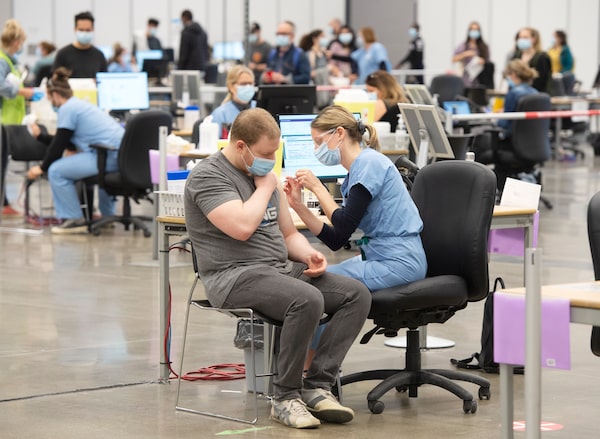
People get their shots at a COVID-19 vaccination clinic in Montreal, on May 13, 2021.Ryan Remiorz/The Canadian Press
A global study involving more than 540,000 people shows that vaccine hesitancy and concerns about safety have declined steadily over the past year, but people in many countries, including Canada, have become more unhappy with how their governments have handled the COVID-19 pandemic.
Researchers at Imperial College London have been tracking people in 29 countries since April, 2020, to gauge how the public has responded to the virus. The latest findings, released Friday, showed polling results from 14 countries, including Canada, that have been surveyed most regularly.
“This program helps ensure that responses to COVID-19 are successful,” said David Nabarro, co-director of the Institute of Global Health Innovation at Imperial. “It recognizes that people are at the heart of every response, changing how they behave to reduce the impact of the virus, and its variants, on their health.”
The report found that willingness to get vaccinated has risen in every country except Australia since November, when the first vaccines were approved.
Britain recorded the strongest support for vaccination, at 67 per cent in April, 2021, compared with 54 per cent last November. That’s likely a reflection of the country’s vaccination program, which has been among the most successful in the world. More than two-thirds of all adults in the U.K. have received at least one dose of vaccine and 18.9 million have had two shots.
In Canada, where the immunization campaign has picked up in recent weeks, the public’s willingness to be vaccinated has increased to 60 per cent from 44 per cent last November.
Even in France, where support for vaccination has been among the lowest in the world, the study found that a general willingness to be vaccinated has increased to 39 per cent from 25 per cent last November. Meanwhile, the percentage of people in France who said they would not get vaccinated fell to 45 per cent from 56 per cent in November.
While Australia was the only country to see willingness fall, it dropped only slightly to 51 per cent from 55 per cent.
At the same time, concerns about side effects have decreased in all but two countries – South Korea and Denmark. Fears about side effects increased to 60 per cent in South Korea from 56 per cent in November, and climbed to 45 per cent from 42 per cent in Denmark.
People in Britain were the least concerned, with just 27 per cent saying they feared side effects. That compared with 46 per cent last November. Canadians came in at 42 per cent, down from 53 per cent who were worried in November.
However, the overall trust in COVID-19 vaccines has dropped in five of the 14 countries since the beginning of the year, when reports surfaced about the Oxford AstraZeneca vaccine’s links to rare blood clots. The biggest drop in trust came in Denmark, where nearly one-third of those surveyed – 32 per cent – said they did not trust the vaccines. That was up from 22 per cent in January.
Denmark stopped using the AstraZeneca vaccine in April because of concerns about blood clots. The country also recently dropped the Johnson & Johnson vaccine for the same reason.
Distrust in COVID-19 vaccines also increased by smaller amounts in Norway, Italy, Australia and South Korea, the study found. But in Canada, those who said they had little or no trust in vaccines fell to 30 per cent in April from 33 per cent in January. People in Britain had the highest level of trust at 83 per cent, compared with 77 per cent in January.
The study found that despite the successful rollout of vaccines in several countries, most people have a dim view of how their governments have handled the pandemic. In 12 of the 14 countries, the share of people who said their governments had managed the crisis well had decreased since last June.
In Germany, for example, 70 per cent of those surveyed last June said their government was doing a good job. That dropped to just 26 per cent in April. The decline could be a reflection of the slow rollout of the vaccination program in Germany and elsewhere in the European Union.
Among Canadians, approval for the government’s management of the pandemic fell to 58 per cent in April from 77 per cent last June. Meanwhile, 38 per cent of Canadians said the government was doing “somewhat badly” or “very badly,” compared with 19 per cent last June.
Only respondents in Singapore and Britain said their governments were doing better now than last June. Government approval was highest in Singapore at 88 per cent, compared with 71 per cent last June. Among Britons, approval increased to 45 per cent from 36 per cent.
Most people across all countries had more confidence in their health care systems than in their governments, but that has begun to wane. Since last June, confidence in health care agencies has fallen in 11 of the 14 countries.
Only Singapore, Britain and Sweden saw an increase in those who said they had a lot or a fair amount of confidence in their health care system’s ability to cope with COVID-19. Among Canadians, confidence has dropped to 65 per cent from 78 per cent.
Our Morning Update and Evening Update newsletters are written by Globe editors, giving you a concise summary of the day’s most important headlines. Sign up today.
 Paul Waldie
Paul Waldie